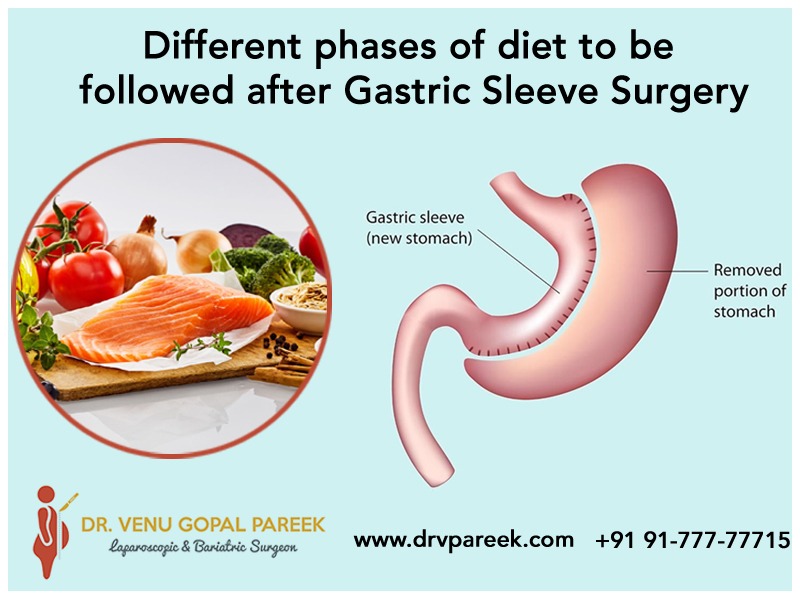
A gastric sleeve diet benefits people who have undergone sleeve gastrectomy or gastric sleeve surgery and are recovering from the surgery.
After the surgery, you will be instructed by your surgeon or a registered dietitian about your diet, and they will also explain the type of food and the quantity of food you should eat at each meal. Following your gastric sleeve diet strictly will help you to recover without any complications and lose weight safely.
Gastric sleeve diets are intended to:
- Ensures your stomach heals and prevents it from stretching as a result of the food you eat.
- You must learn to eat smaller portions so that your smaller stomach can digest easily and safely.
- Reduce your weight and prevent you from gaining weight
- Prevents post-surgical complications and side effects

Different phases of the diet
If you have undergone gastric surgery, you should pass through five phases of the diet, which include:
- Clear liquid
- Full liquid
- Pureed foods
- Soft foods
- Protein-rich nourishing diet.
In each phase, you will spend approximately one week. Remember, the phases cannot be skipped.
Read: Diet to be maintained before and after gastric sleeve surgery?
Week 1 (Phase 1) – Clear Liquids
Following your gastric sleeve surgery, you will follow the same clear liquid diet you started two days before your surgery. As a result, your body will have more time to heal and also helps you to prevent postoperative complications like diarrhoea, constipation, and dehydration.

You might think a clear liquid diet will be difficult to stick to, but many people who have undergone gastric sleeve surgery report that they feel little or no food cravings immediately after surgery.
To minimize nausea, it’s advisable to start by taking sips of clear liquid. You can increase the volume gradually with time. To avoid dehydration, you may need to drink more clear liquids (a minimum of 2 litres per day). Drink in small quantities throughout the day, from when you get up until you go to bed.
Clear liquids can include:
- Water
- Coffee or tea without caffeine which includes herbal, fruit, and green.
- A clear broth made from chicken, beef, or vegetables.
- Drinks made with Bovril or Marmite.
- Diluted fruit juices
- Sugar-free drinks and diluted squash.
The following should be avoided:
- Caffeine
- Sugary drinks
- Carbonated drinks
Week 2 (Phase 2) – Full Liquids
You will enter into phase 2 in your second week after surgery. You may need to continue to drink a lot of clear fluids with protein-rich fuller liquids. Even though your appetite increases, your digestive system hasn’t yet evolved to deal with solids. You should hydrate yourself with a wide range of nutritional liquids.
Along with clear liquids, you can have the following full liquids:

- Low-fat milk. Low-calorie hot chocolate may be added to milk to make it tastier.
- Smoothies that are made at home.
- Drinks and shakes help you in losing weight.
- Drinks made with yoghurt.
- Smooth soups made out of tomato cream, chicken, or even oxtails.
- Plain Greek yoghurt or frozen yoghurt without fat and sugar-free
- Sugar-free sorbet is often called “Italian ice” or “water ice.”
Caffeine, sugary and carbonated drinks should still be avoided.
You should also avoid the following foods:
- Foods rich in sugar
- Foods high in fat, like whole-milk yoghurt
- Food that included solids
Week 3 (Phase 3) – Pureed Foods
You can start adding some plain, pureed (mashed up) foods to your daily diet by the end of the second week and at the beginning of the third week. Your body needs 60 grams of protein every day, so start adding protein food to every meal.
There should be no solid pieces of food in the mix; it should be like a thick paste or thick liquid. When you blend your food, you can add milk, but make sure it does not have lumps and a yoghurt-like texture.
During this time, you might find it difficult. Eat slowly in small portions, 3 to 6 times a day. It is recommended to consume four to six tablespoons of food per meal. Identify and avoid foods that cause gas, bloating, or diarrhoea.
As soon as you can handle pureed foods, you can take vitamin and mineral supplements to help prevent nutritional deficiencies.
Pureed foods can include:

- Mashed fruits – bananas, avocados, etc. Beware of the sugar content.
- A steamed fish blend and canned tuna or salmon
- Mashed sweet potato.
- Low-fat cottage cheese
- The liquid form of meat or fish soup.
- Liquidised cooked vegetables.
- Soft scrambled eggs.
- Ground meat or beef.
You can use water, skim milk, juice without sugar, or broth to blend solid foods.
Foods to avoid:
- Starch-rich food like pasta, rice & bread.
- Raw vegetables like broccoli, sprouts, and leafy green vegetables.
- Fatty foods.
- Spicy food.
Week 4 (Phase 4) – Soft foods
When you enter the 4th week, and if your doctor says OK, you can add certain soft foods to your diet. Otherwise, you should continue pureed foods for the following weeks.
These soft foods should be small, easy to chew, and digestible pieces of food. A small meal can be eaten 3 to 5 times a day. It is advised that every meal contains one-third to half a cup of food. Chew every bite thoroughly until the food is pureed before you swallow. You may have caffeinated drinks at this time but in moderation.
Soft foods to include in your daily diet:

- Well-cooked meat
- Soft fish or Flaked fish
- Minced lean meats
- Properly cooked vegetables (remove skin)
- Cottage cheese and Low-fat cheese
- Eggs
- Soups with lumps
- Canned or fresh soft fruit without skin and seeds
- Sweet potatoes
- Rice
- Cooked and low-sugar cereal
Avoid foods that are hard to digest, such as tough vegetables, nuts, white potatoes, etc.
Week 5 and beyond – healthy diet
Typically, you can eat solid food by the end of the fifth week. As you create a healthier eating plan, you can use it as a general template for eating healthily for the rest of your life.
The new diet you follow should contain low fats, low calories, and portion control. In addition, you will receive support and advice on your customized diet from your team of bariatric experts.
Introduce new foods slowly and monitor how your body reacts to them. Try to avoid empty-calorie foods because they may not contain nutritional value. Instead, maintain a healthy eating plan of three small meals throughout the day and limited snacks.
According to your tolerance of solid foods, the frequency and quantity of meals can vary. Be sure to discuss your options with your dietitian.
Keep yourself hydrated at all times.
Healthy diet foods include:
- Lean meat, poultry
- Fish.
- Dairy products that are low in fat.
- Cooked or raw veggies and fruits.
- A good source of starch or carbohydrates
- Whole grains.
- Small amounts of fat.

Additional foods to avoid are:
- High-calorie foods and beverages.
- Sugary drinks and sweets.
- Fried and spicy foods
To achieve and maintain your weight loss goals, you must maintain a healthy, protein-rich, low-fat, balanced diet for the rest of your life.
Long term diet tips after sleeve gastrectomy:
- Maintain a three-meal schedule every day.
- Protein food should be the first thing you eat at every meal.
- Bring various foods into the mix one at a time.
- If your bariatric doctor has directed you to take a vitamin and mineral supplement daily, you should take a pill once daily. You may also need to get vitamin B12 injections (1mg) once every 3 months.
- Eat slowly and swallow food after chewing it thoroughly. Food is easier to swallow and digest if it is chewed thoroughly.
- Organize your meals to prevent temptation from unhealthy foods.
- Drink more water and keep some water close at hand.
- Between meals, when you feel hungry, try taking a drink first. This is because sometimes your body might mistake hunger for thirst. If you still feel hungry, eat a small snack of fresh fruit or low-fat yoghurt.
There are many other things to avoid, like eating & drinking together, overeating, etc. To know more about diet plans and bariatric surgery for weight loss, consult Dr Venugopal Pareek, an experienced bariatric surgeon in Hyderabad. He helped thousands of obese patients to lose weight by performing various advanced bariatric procedures, including sleeve gastrectomy.







